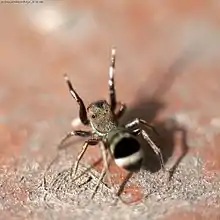| Siler | |
|---|---|
 | |
| S. cupreus from Japan | |
| Scientific classification | |
| Domain: | Eukaryota |
| Kingdom: | Animalia |
| Phylum: | Arthropoda |
| Subphylum: | Chelicerata |
| Class: | Arachnida |
| Order: | Araneae |
| Infraorder: | Araneomorphae |
| Family: | Salticidae |
| Subfamily: | Salticinae |
| Genus: | Siler Simon, 1889[1] |
| Type species | |
| S. cupreus Simon, 1889 | |
| Species | |
|
9, see text | |
| Synonyms[1] | |
Siler is a genus of Asian jumping spiders that was first described by Eugène Louis Simon in 1889.[3] They specialize in hunting ants.[4]
Species
As of August 2019 it contains nine species, found only in Asia:[1]
- Siler bielawskii Zabka, 1985 – China, Vietnam
- Siler collingwoodi (O. Pickard-Cambridge, 1871) – China, Japan
- Siler cupreus Simon, 1889 (type) – China, Korea, Taiwan, Japan
- Siler flavocinctus (Simon, 1901) – Singapore
- Siler hanoicus Prószyński, 1985 – Vietnam
- Siler lewaense Prószyński & Deeleman-Reinhold, 2010 – Indonesia (Sumba)
- Siler pulcher Simon, 1901 – Malaysia
- Siler semiglaucus (Simon, 1901) – India to Philippines
- Siler severus (Simon, 1901) – China
References
- 1 2 3 "Gen. Siler Simon, 1889". World Spider Catalog Version 20.0. Natural History Museum Bern. 2019. doi:10.24436/2. Retrieved 2019-09-23.
- ↑ Prószyński, J. (1984). "Atlas rysunków diagnostycznych mniej znanych Salticidae (Araneae)". Wyższa Szkola Rolniczo-Pedagogiczna, Siedlcach. 2: 135.
- ↑ Simon, E. (1889). "Etudes arachnologiques. 21e Mémoire. XXXIII. Descriptions de quelques espèces receillies au Japon, par A. Mellotée". Annales de la Société Entomologique de France. 8 (6): 248–252.
- ↑ Jackson, RR; Van Olphen, A (May 1992). "Prey‐capture techniques and prey preferences of Chrysilla, Natta and Siler, ant‐eating jumping spiders (Araneae, Salticidae) from Kenya and Sri Lanka". Journal of Zoology. 227 (1): 163–170. doi:10.1111/j.1469-7998.1992.tb04351.x.
External links
This article is issued from Wikipedia. The text is licensed under Creative Commons - Attribution - Sharealike. Additional terms may apply for the media files.